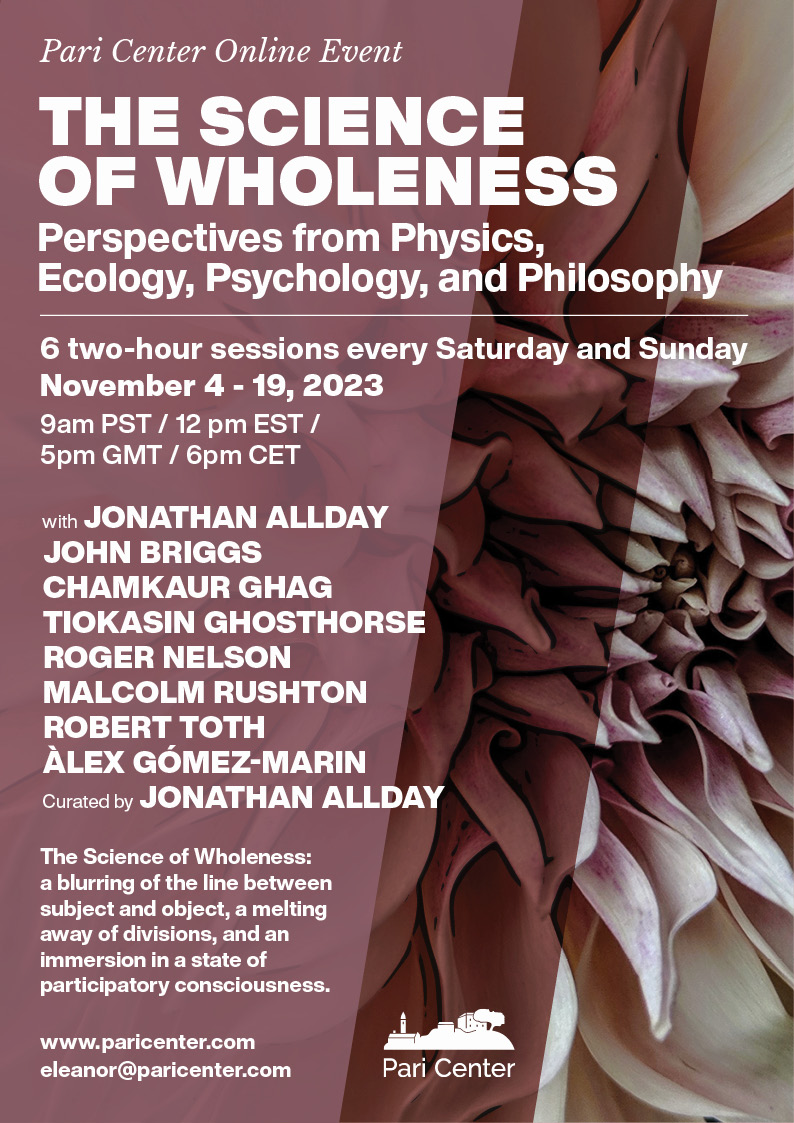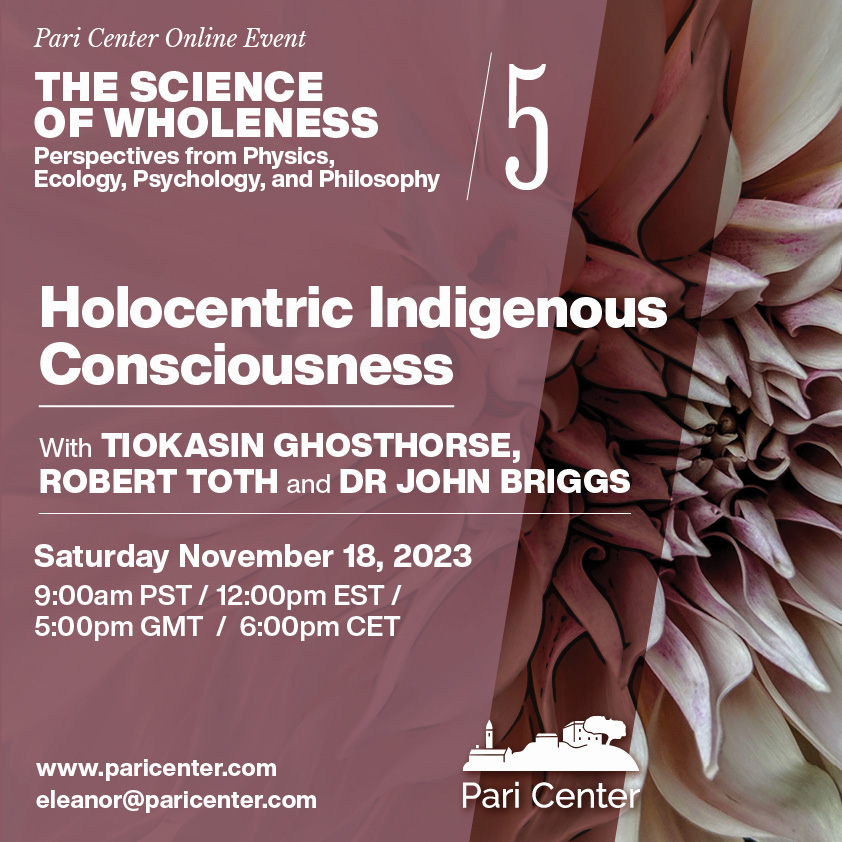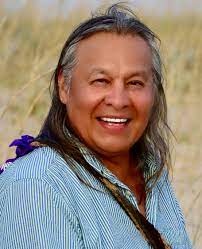Your cart is currently empty!

Holocentric Indigenous Consciousness
- This event has passed.
November 18, 2023 @ 6:00 pm – 8:00 pm CET

Buy the recording

The Science of Wholeness 5/6: Holocentric Indigenous Consciousness (with Tiokasin Ghosthorse, Robert Toth and Dr. John Briggs)
Holocentric Indigenous Consciousness
with Tiokasin Ghosthorse, Robert Toth and Dr. John Briggs
Saturday November 18, 2023
9:00am PST | 12:00pm EST | 5:00pm GMT | 6:00pm CET
2-hour session
The session is live and you will be sent the RECORDING.
Traditional Indigenous people the world over regularly employ a holistic mode of consciousness that affirms they are inseparable from the natural world. Their lives are guided by this mode. The holocentric mode is a natural feature of all human consciousness but has been suppressed in the last few thousand years by the rise of cultures organized from a second ancient mode of consciousness: the anthropocentric or human-centered mode.
Anthropocentric consciousness, which derives from perceptions that the world is made of separate things dominates the way most people living today perceive reality. By contrast, holocentric consciousness focuses on the world as a source of unity, relationships, and beauty. The holocentric mode of consciousness continues to function as a “ground state consciousness” for traditional Indigenous people and, in a different context, for creative artists.
The anthropocentric and holocentric modes are roughly parallel to the awarenesses of the left and right brains functions as described by Ian McGilchrist.
Indigenous cultures are shot through with an attention to the whole. The world is approached as a living being and a collection of fellow beings acknowledged in the Lakota phrase, mitakuye oyasin, “all my relations”— animal, vegetable, water, wind, land, sun, sky: all things which are not things, but spirit.
This presentation will show, a holocentered way of being is manifest in the traditional practice of reciprocity; in ceremonies; in metaphors shaped in stories, art and dance, and in engagement with what Leroy Little Bear, borrowing from his friend David Bohm, describes as the “holoflux”: Shape shifting in the holoflux is a potent expression of Indigenous wholeness. Tiokasin says: “You will never know what is really there, but you know something is there. As soon as you think you’ve got it, it changes, shape-shifts. You never get it.”
Working from material they have developed during the past seven years on Indigenous holistic consciousness, the three presenters will sketch a picture of the original holistic mode of consciousness that has been buried and obscured by our virally growing anthropocentric knowledge and our obsessive cleverness at manipulating apparently separate things.
Here’s an Indigenous story of wholeness:
One day when we were visiting her on the Tohono O’odham Reservation in southern Arizona, our friend, elder Ofelia Rivas said, “My mother told me the story of how this farmer was working in the fields. He was really tired and grumpy. He came home, did his normal things. He went to bed early and expected to go back to the fields. He had a dream in which these warriors came and said he was being called to a meeting; so he got ready.
“At the time they had these little lanterns you could light and carry. I think it was kerosene they used. So he took his little light and went with the warriors. In the story he was being brought to a meeting in which he was told that he did something wrong. Did he know what he did and that people were suffering because he did something wrong. He claimed ‘I don’t know what I did wrong. Can you tell me please what it is?’ In that pleading he woke up.
“He got his lantern and he walked the trail he always walked, and he followed his footsteps all the way back to his fields. He finally found a big ant mound. When he was grumpy and was haphazardly walking on that trail, he had accidentally kicked a pebble into the anthill’s entrance hole. Around the whole anthill were dead ants.
“So he removed the pebble from the opening and he left the lantern. He told the ants, ‘The lantern will help you warm up and you can go back in. I’m sorry this happened.’
“That’s the lesson I tell the young people. Be very careful how you walk on this land, you don’t know what is there. You may have missed something that was important and you may have affected it in some way. Those are the kinds of lessons I learned. It’s the same way in ceremony. You regard everything as sacred.”
To see the Full The Science of Wholeness Program

Tiokasin Ghosthorse (Lakota), Cheyenne River Lakota Nation of South Dakota. Tiokasin is a survivor of the U.S. Bureau of Indian Affairs Boarding and Church Missionary School systems designed to “kill the Indian and save the man,” and the “Reign of Terror” from 1972 to 1976 on the Pine Ridge, Cheyenne River and Rosebud Lakota Reservations. He has a long history of Indigenous activism and advocacy. He is a guest lecturer at many universities and international speaker and on Peace, Indigenous and Mother Earth perspectives, cosmology, ecology and forestry and perspectives on the relational/egalitarian vs. rational/hierarchal thinking processes of western society. Tiokasin is the founder, host and executive producer of the 30 year-old “First Voices Radio”, a one-hour live program syndicated to 70 radio stations in the US and Canada.
He was awarded Staten Island’s Peacemaker Award in 2013 and nominated for the Nobel Peace Prize in 2016 by The International Institute of Peace Studies and Global Philosophy. Tiokasin serves on boards of several charitable organizations dedicated to bringing non-western education to Native and non-Native children. He is a master musician and teacher of magical, ancient and modern sounds and has performed for audiences worldwide. A Sun dancer in the Lakota Nation tradition, he describes himself as a “perfectly flawed human being.” www.firstvoicesindigenousradio.org

Robert G. Toth served as Executive Director the Merton Institute for Contemplative Living from 1998 to 2010. He co-edited Bridges to Contemplative Living with Thomas Merton, a popular series designed for small group dialogue. He is an active member of The Contemplative Alliance, an initiative of the Global Peace Initiative of Women, which organizes dialogues and programs around the world to advance contemplative approaches to issues affecting the welfare of all being. He also serves on the Board of the Lake Erie Institute which offers holistic ecological leadership programs to individuals engaged in creating flourishing, regenerative, and socially just communities.

John Briggs, PhD, taught for 25 years at Western Connecticut State University. He has taught aesthetics, journalism, and creative writing and served as co-chair of the English Department; he was one of the founders of the Department of Writing, Linguistics and Creative Process and one of the principal developers of the MFA in Professional and Creative Writing. He is now Emeritus Distinguished Professor of Writing and Aesthetics at WCSU. Among his many publications are three books he co-authored with David Peat, Looking Glass Universe (1984), Turbulent Mirror: An Illustrated Guide to Chaos Theory and the Science of Wholeness (1989), and Seven Life Lessons of Chaos(1999). He lives in the New England town of Granville, Massachusetts.
